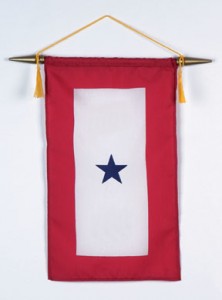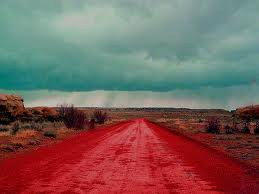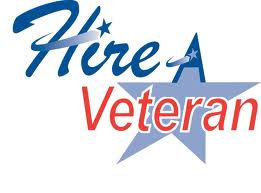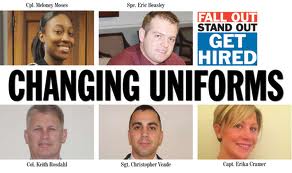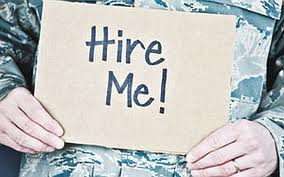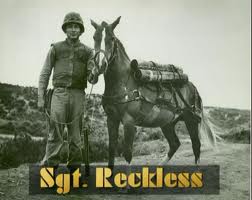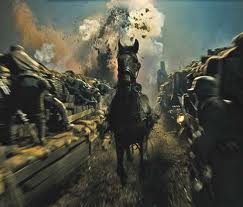May
10
SPRING CLEANING
Filed Under Tears | Comments Off on SPRING CLEANING
by Janet J. Seahorn, Ph.D
Once again spring has arrived after many months of Mother Nature hibernating in her winter form. Winter in its symbolic character is a time where living plants and many animals decide to go into a quiet, simple mode. Trees and plants lose their foliage, bears snuggle into their caves to rest and sleep, and the rest of us tend to sit, eat, and gain a few more pounds than we want to paste onto our lethargic bodies.
Now it can be time for a new beginning. One that can offer us fresh hope for the coming days ahead. One that brings new opportunities if we are brave enough to journey into the unknown and try something different. And one, if we are willing, encourages us to rid ourselves of old habits, ideas, and behaviors that may not be serving us well. Yep, spring is a glorious time for nature, yet for many of us the analogy and reality of cleaning house can be both tiring and not that enjoyable. Procrastination’s lure is a powerful obstacle.
For days I have contemplated what things I would keep and what things I might get rid of as I go forward. No, I’m not talking about cleaning out my overstocked closets, cupboards, and drawers, although this might be a good beginning. If only “cleaning” my brain would be so easy. I’m thinking about those beliefs, behaviors, and attitudes that aren’t serving me all that well. You know what I mean, the ones that can make you overly anxious, angry, judgmental, and, really, not the type of person you want to be.
I could list several pages of what makes me feel like a cleaning is needed. Beginning with the government, politics, apathetic people, wars, PTSD, health care… and items for which I have little or no control. Something like the song, “Let There Be Peace on Earth and Let It Begin with Me” comes to mind. Seems like many times I am criticizing the person with opposite viewpoints, rather than trying to understand his/her position. Next would come, let the past be the past. I can’t change it so why do I keep chewing on it like a pit bull with an old bone? Because I tend to have an anal retentive personality and my over active memory systems feel compelled in having me examine too many angles from a prior experience. Unfortunately, memories may not always be that accurate and replaying them over and over only adjusts the volume instead of focusing the real picture.
Perhaps all of this “inner” housecleaning comes down to one simple act, forgiveness. Such a modest concept, yet so bloody difficult to achieve. And here come the clincher for all of this – a quote that appeared in an Oprah magazine way back in 2000,
“You become what you believe – not what you wish or want but what you truly believe. Whatever you are in life, look at your beliefs. They put you there.”
Dang, Spring House Cleaning just got a whole lot harder. I wonder if I can get by with merely repainting the walls.
May
7
NEW TERM FOR PTSD: POST-TRAUMATIC STRESS “DISORDER” becomes “INJURY”
Filed Under Post-Traumatic Stress "Injury", PTSD, PTSD treatment, Tears, Tears of a Warrior, Today's War, War Injury | Comments Off on NEW TERM FOR PTSD: POST-TRAUMATIC STRESS “DISORDER” becomes “INJURY”
by Tony & Janet Seahorn
Wow, double Wow, and Wow again! Finally a more accurate term for Post-Traumatic Stress which leaves off the BIG “D”.
It has been a long time coming and we certainly hope that those in charge of giving terms to the various wounds of war will carefully consider renaming PTSD to PTSI– Post-Traumatic Stress Injury. We have constantly said that Post-Traumatic Stress refers to a reordering of the brain neuro networks. But calling it an injury versus a disorder is a huge step in the right direction.
Think about it, we don’t refer to cancer as a disorder, or a broken bone as a disorder. Trauma caused by outside forces essentially is an injury, however, the injury goes far beyond the mere physical damage of an organism; these wounds also impact the soul, spirit, and emotional stability of the individual and are far more challenging to heal.
For the longest time in the early 19th and 20th centuries, cancer was not openly discussed and considered by some as an illness brought on by an impoverished life style both of the mind and body. Afflicted folks often felt responsible for their illness and were shunned by some in their communities. By gaining a more accurate understanding of any problem we are able to provide better treatment and services for both healing and coping.
And so it may be tentatively happening for those struggling with post-traumatic stress. We have heard from several readers about this change of wording. For those who have not yet read about the change in terminology, we are including this short clip from Sunday, May 6th Denver Post:
PTSD MAY GET NAME CHANGE TO HELP VETERANS
It has been called shell shock, battle fatigue, soldier’s heart, and, most recently, post-traumatic stress disorder, or PTSD.
Now, military officers and psychiatrist are embroiled in a debate over whether to change the name of a condition as old as combat. The potential new moniker, post-traumatic stress injury.
Military officers and some psychiatrists say dropping the word “disorder” in favor of “injury” will reduce the stigma that stops troops from seeking treatment.
Let’s hope those with the power to make such a change will give the new term their best consideration. Word/terms do make a profound difference between how we view and treat those who have given so much to our country – along with other sufferers. Calling combat trauma an injury is far more correct than calling it a disorder.
With any luck we can get it right this time.
Feb
10
A HOLOCAUST OF THE SPIRIT
Filed Under American Patriotism, Holocaust, PTSD treatment, TBI & PTSD, Tears, Tears of a Warrior | Comments Off on A HOLOCAUST OF THE SPIRIT
by Janet J. Seahorn, Ph.D
It is interesting how many people still have not heard of Post Traumatic Stress. It’s as if they have been living under that rock in the Geico commercial. Maybe part of this circumstance is due to the fact that less than 1% of Americans are currently serving in the military. During WWII one could walk down most streets throughout the U.S. and count at least five houses that had a star in the window.
Today, as in the Vietnam War, we no longer have signs that signify to others that a family member is serving overseas. Little is shown to symbolize the sacrifice of the few. Somewhere a child is missing his father or mother each night before she goes to bed. Somebody’s mother may be crying herself to sleep again, worried sick about the safety of her child. A spouse is having to carry on every detail of daily chores by herself/himself and doing it each day with a loneliness that shatters the heart.
Many ask us what it is like living with PTSD. For me, I think the best description is the trauma of combat leaves many vets with a Holocaust of the Spirit. Webster’s Dictionary defines holocaust as a “vast or total destruction, usually by fire; great loss of life or property; a sacrificial offering consumed by fire”. Such a description is pretty accurate when you think about it. During battle, not only is there physical fire, there is the mental and emotional fire — a fire in the heart, brain, and soul. Then there is that word “sacrifice”. Sacrifice is always the consequence of any combat experience: sacrifice for one’s country, sacrifice for unknown people in unknown areas of the world, sacrifice for one’s fellow troops, and sacrifice of families left behind to wait and pray for their loved one’s return.
As with every Holocaust, loss of life is ever present. And that life, if one survives, will never be the same. The fire of battle has consumed what a person was before the experience, and left him with scars that tend to break and reopen with the living of each new day. It is a never ending journey towards healing. Some days are better than others, but not one day is ever the old picture of “normal”.
Yet, here is the important part of any Holocaust to remember … It can be survived! Like the mythical bird, the Phoenix, who was burned beyond all recognition and rose from its ashes to become an immortal body and spirit, many of our PTSD burdened veterans achieve a similar destiny. Both are warriors of distinction and beauty. Both died in their own painful fire, and both became molded into something purer in spirit and stronger in mind and body.
It is easier to endure the fire if you can hold onto something precious to the heart and spirit. Therefore, I included the following old Pueblo Indian Blessing that my brother recently shared with me (365 Days of Walking the Red Road)
Hold on to what is good, even if it is a handful of dirt.
Hold on to what you believe, even if it is a tree that stands by itself.
Hold on to what you must do, even if it is a long way from here.
Hold on to life, even if it is easier to let go.
Hold on to my hand, even if I have gone away from you.
Feb
2
VETS, JOBS AND MISCONCEPTIONS
Filed Under Tears, Tears of a Warrior, Troops, Veterans, War | Comments Off on VETS, JOBS AND MISCONCEPTIONS
by Janet J. Seahorn, Ph.D
Recently, Tony and I visited with a group of veterans from the Military Order of Purple Heart. Attending were vets from WWII, Korea, Vietnam and the current conflicts. While discussing our book, Tears of a Warrior and the issues of PTSD, we got on the topic of how challenging it is for veterans returning from war to find a job. Only in recent times has the issue of work for veterans become clearer.
Many of us thought veterans who came home from serving in WWII were greeted with big parades and wonderful new career opportunities. For years I was under such an assumption. Then I talked with several WWII veterans and what they described was something much simpler. For most, once they returned home they did what historically other veterans had done before them… they went home, tried to find a suitable job and raise a family. Little was written or said about the struggle in finding employment or integrating back into civilian life. For many, there were no parades, no bands welcoming them home, only the test of getting on with life.
Eric Jensen explains in his book about his father, Forever and a Day: The World War II Odyssey of an American Family, how hard it was to find work after the war. As he wrote, many of the jobs were already filled by civilians who had those positions during the war. When the veterans returned there were not as many opportunities for employment as we first believed. Jensen wrote how frustrating it was for his father to have spent so many years away from his family only to return to another struggle – finding a job that would pay enough to support his young family.
Today, too many employers believe erroneously that vets returning from Iraq and Afghanistan may be suffering from PTSD or TBI and are reluctant to hire someone who may be emotionally compromised. We have written on several occasions how this is simply not the case for the majority of combat personnel. Military personnel have proven over and over again that they are bright, committed and competent employees. Given a task, they will make sure it gets completed in a satisfactory manner. They will show up daily, even when they are tired or under the weather. Veterans are some of the most proficient and capable members of an organization.
Part of the healing process of our soldiers, both young and old is to value their sacrifice for our country by honoring them with suitable jobs. One struggle we can help them avoid is a struggle to find work. As a country and as a community perhaps offering employment can be a step of vast significance.
In addition to mending them, “If we send them, let’s then employ them” when they return.
Jan
17
A HORSE NAMED RECKLESS
Filed Under Combat PTSD, Sgt. Reckless, Tears, Tears of a Warrior, War, War Horse | Comments Off on A HORSE NAMED RECKLESS
by Janet J. Seahorn, Ph.D
Amazing story!
This was sent to us recently from one of our readers, Larry Mathena. We had just seen Steven Spielberg’s movie, War Horse, which chronicled (even fictionally), the high cost of war on horses during WWI.
Like people, our four-legged comrades share similar emotions of friendship, love, pain, and grief.
Reckless, however is a true story of a courageous animal that fought in the Korean War.
Read on and view the video. I am sure it will touch many of your hearts like it did ours.
A special thanks to Larry for sharing this heroic story.
|
Dec
21
IN LOVE WITH HOPE
Filed Under Holiday Season, Hope, Tears | Comments Off on IN LOVE WITH HOPE
by Janet J. Seahorn, Ph.D
Ok, its official, I’m in love with Hope. Always have been. Don’t know why. It defies logic most of the time. When days are good this is an easy task to be in love with Hope. When things are tanking in the toilet being in love with Hope isn’t so simple. For any individual who has experienced loss, trauma, or any of life’s emotional challenges, Hope may be the only thing that serves as one’s raft in a storm. Without Hope it can be impossible to manage getting through the present minute let alone waking up to another tomorrow. Hope is the ingredient that provides emotional as well as a sense of physical safety.
You may ask what gear can we put in our life rafts that may help us sustain our journey with Hope. For a start – include at least one person who believes in us. One person who will stand with us during joyful and difficult times. One person who can demonstrate we are loved and worthwhile. To have that one person be part of our crew we must also be that person for another human being. Taking without giving does nothing to encourage or grow Hope. Another piece of gear is simple giving yourself permission to step back and take time to let go of some of your stressors. Give them up to a higher source or put them in writing and then throw it in the trash. One last, essential item in your boat must be joy. Be willing to search out a bit of joy each day, and be optimistic that a tiny bit of joy will be waiting for you the next.
For me, Hope is the one thing that gives a deeper purpose and meaning to life. In spite of the horrors of combat, warriors (and their families) seem to truly understand such a concept. Being stripped of personal well-being, observing others injured and killed sometimes leaves you with only one thing, and that is the capacity to perceive that our existence has a purpose greater beyond our immediate understanding. This is HOPE in action. Hope that boosts our resilience. Hope that enhances our emotional muscles and Hope that gives us a vision for a better tomorrow.
Whatever our pain, however stressful our lives might be right now, we cannot let these things take up ALL of our time. We must leave some room for laughter, for pleasure, and for joy. Hope can live within us even in what can be the most desperate of times.
So here is my Holiday wish for you,
May you be filled with the power of Hope and what can be — Be in Love with Hope.
Happy Holidays
Jun
2
Fears, Tears, and Funny Facts
Filed Under Tears | 4 Comments
 It is Saturday morning and my alarm clock wakes me up. I really want to sleep until my body’s time clock rouses me, but we are going to Cheyenne to watch, listen, and learn how parents, spouses, and community members are dealing with the recent deployment of their 5-state National Guard unit. From 9 in the morning until 2 in the afternoon we heard from spouses, parents, friends, and others who had experienced prior deployments or had a loved one who is now a part of this current operation. Each story was told from a different perspective, yet all voiced similar sentiments of fear, worry, and concern for how to deal with every day life without their loved ones. They talked of pride for the service and dedication the soldiers are giving for their country. Below are just a few of their narratives.
It is Saturday morning and my alarm clock wakes me up. I really want to sleep until my body’s time clock rouses me, but we are going to Cheyenne to watch, listen, and learn how parents, spouses, and community members are dealing with the recent deployment of their 5-state National Guard unit. From 9 in the morning until 2 in the afternoon we heard from spouses, parents, friends, and others who had experienced prior deployments or had a loved one who is now a part of this current operation. Each story was told from a different perspective, yet all voiced similar sentiments of fear, worry, and concern for how to deal with every day life without their loved ones. They talked of pride for the service and dedication the soldiers are giving for their country. Below are just a few of their narratives.
- The Brigadier General gave the introduction of his own earlier deployment and how it made him more appreciative for the beauty of the common landscape of Wyoming. The freshness of new grasses in a meadow. The smell of wildflowers and warm sunshine instead of Iraq’s dust and withering heat. And, as he was driving to the meeting, he had the special gift of seeing a mother antelope give birth to its newborn fawn. From the dreadfulness of the combat zone to the miracle of new life, one is constantly reminded of the beauty of America.
- A husband and wife chatted about their experiences. The discovery of hidden strengths, the challenges of fixing leaky pipes and broken cars, and the difficulty of not being able to see and hold one another at the beginning and end of each day. Other funny facts they shared:
- How the military takes care of every need and item in your life including your relationships, “If we wanted you to have a wife, we would have issued you one.”
- MRE which is the acronym for “Meals Ready to Eat” to what he thought they really are – “Meals Refusing to Exit”
- Another spouse spoke of how she now refuses to attend any “good-bye” ceremonies. She has done this before and learned that, for her, it was far better to say her farewells at home. Watching the panic of small children holding onto their parent’s pant legs and crying, “Please don’t leave me”. Wives weeping, sad faces, the combat exit…all were a bit too much. She gave herself and others permission to make choices that preserve their fragile emotional state.
- One young women told of how, shortly after she learned that her husband would be deployed for a second time, had a devastating stroke. She is working her way back to health with the support of family and friends. It is important that her husband not worry about how she is healing while he needs to be focused on completing and surviving his mission in Iraq and Kuwait.
Yes, the stories and the story tellers are linked together by their common situation, a situation of having a loved one living in a combat zone thousands of miles from home. A situation which requires those left at home to be braver, stronger, more responsible and independent than ever before. It seemed as if a mantra could be heard throughout the day: “I’m handling it – whatever “it” is or will be.” And they are not alone, for going through the next year will be easier with a solid base of friends, families, supportive communities, and the attentive resources from the military.
May
8
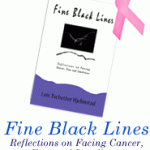 A few weeks ago, during a book publication meeting, I met a lovely lady, Lois Hjelmstad, who had written a book, Fine Black Lines, of reflections of how she survived cancer told in journal entries, reflections, poetry, and photographs. One of her poems reflected what many veterans and their families have experienced when living with PTSD. Since many of life’s challenges have “emotional” similarities, I thought our blog readers might find this particular selection meaningful.
A few weeks ago, during a book publication meeting, I met a lovely lady, Lois Hjelmstad, who had written a book, Fine Black Lines, of reflections of how she survived cancer told in journal entries, reflections, poetry, and photographs. One of her poems reflected what many veterans and their families have experienced when living with PTSD. Since many of life’s challenges have “emotional” similarities, I thought our blog readers might find this particular selection meaningful.
It’s best to act normal…
To say, “I’m just fine.”
What everyone wants is
A positive sign.
Just smile and say thank you
When people will ask.
One mustn’t let on that
Each day is a task.
Friends keep on calling…
You know they mean well.
But really they’d rather
For you not to tell
Each symptom, each detail,
Each wearisome day.
Or mention that small fear
You can’t drive away.
An illness gets tiring…
For them and for you.
The difference is simple…
They get to quit.
( © 2003 Lois Hjelmstad)
303.781.8974
Wouldn’t it be great if, when the demons appear, one could simply say, “I Quit”, and everything would be normal? The reality of the situation is that warriors Never Quit, they keep on going no matter what battles they are waging. For that, my friends, is the very essence of a true warrior.
Mar
10
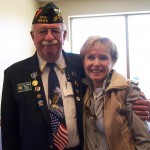 Celebration: New Veteran’s Center
Celebration: New Veteran’s Center
With today’s economic and world issues, it sometimes appears there is little to celebrate. Last Friday morning was an exception. It was the opening of the new VA Clinic in Fort Collins, CO. The Center is a place where our wounded warriors can go to heal, to obtain support for both emotional and physical problems, and a place to get information. Dozens of VA dignitaries, community members, veterans and their families, as well as delegates representing Mark Udall, Michael Bennett, and Betsy Markey attended the special ribbon-cutting celebration. Unquestionably what made the celebration special were the people; people who have given so much in service of our country. And people who are giving so much to heal them: doctors, nurses, therapists, office workers, and the list grows. There were a few individuals I spoke with who moved my heart. The first was Dan Griffin. I didn’t focus on his rank or even the conflict in which he served. These details just didn’t seem all that essential to me at the time. What drew me to Dan Griffin was his solitary stance of dignity. He wore a uniform and hat filled with medals and ribbons. He didn’t mingle much, just stood in a back corner of the room watching, listening. I walked over to him, drawn by his silence and stature. It was obvious he was a shy person – even told me this himself. I asked a few questions of him and he responded to with a minimum of words. Proudly he mentioned to me that next year he will be the Commander of Post 10 of the VFWs – the largest VFW post in the state of Colorado. Then he went on to talk about last summer’s group reunion in Gunnison. He described how much he liked to fish, especially the lakes with the “Big Ones”! Upon leaving, I gave him a hug. What I really wanted to say to Dan Griffin, but the words were caught in my throat, was how much I honored and appreciated his service, his life, his courage.
Then there was Meg Corwin whose quiet sacrifice few people will ever have to endure. She had been a military person for over twenty years, recently retired and now serving on Senator Michael Bennet’s staff. Her husband was shot and killed by a sniper two years ago during his second tour of duty in Iraq. Saying “Thank You” for your service and your husband’s sacrifice just seemed a bit passé. How can one truly thank a person who has given so much? I couldn’t. Ms. Corwin showed such strength and dignity during her speech to the group. I questioned if I could be so brave in similar circumstances – whether I could talk about my loss with such control? Truly, I don’t know the answers. What I do know is this; many families have made similar sacrifices. Many families, mothers, fathers, sisters, brothers, spouses, children, friends mourn their loss silently with wounded hearts and spirits.
The new Veteran’s Center is a place of hope and healing for each of these exceptional individuals. If you know of a veteran or his/her family member, please be thoughtful enough to press their hands and say, “You are special to me. I will try not to forget what you have gone through; what you have given so that America can enjoy her freedom. Thank you.” Keep them in your thoughts and prayers. Do everything you can to live this motto:
If we send them, then we must mend them.
Dec
15
Troop Deployment Meeting
Filed Under Tears | 4 Comments
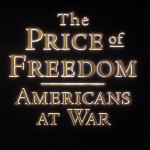 It is a crisp December afternoon two weeks before Christmas. My husband, Tony, and I are driving up to Cheyenne, WY to meet with the National Guard’s Brigade Commander, COL Richard Knowlton and his immediate staff. Along the roadside we come across a herd of magnificent buffalo grazing on the hillside much like they did a century before. Their presence reminded me of how minor time is and how closely linked humankind is to the past, present, and future. Over many decades, these animals were slaughtered off by the ignorance of mankind. Yet, they survived, in spite of enormous odds, they are still with us. For a moment the picture gives me a bit of hope that we, as Americans, will continue to move beyond the challenges of the present moment. That our troops will be able to sustain the test of war, and return to us safe and whole in body, mind, and spirit.
It is a crisp December afternoon two weeks before Christmas. My husband, Tony, and I are driving up to Cheyenne, WY to meet with the National Guard’s Brigade Commander, COL Richard Knowlton and his immediate staff. Along the roadside we come across a herd of magnificent buffalo grazing on the hillside much like they did a century before. Their presence reminded me of how minor time is and how closely linked humankind is to the past, present, and future. Over many decades, these animals were slaughtered off by the ignorance of mankind. Yet, they survived, in spite of enormous odds, they are still with us. For a moment the picture gives me a bit of hope that we, as Americans, will continue to move beyond the challenges of the present moment. That our troops will be able to sustain the test of war, and return to us safe and whole in body, mind, and spirit.
And then my heart remembers Wednesday evening. We attended a community/family information meeting for area businesses and families of guard members who will be deployed in April, 2009 to serve in Kuwait and Iraq. This will be a troop size of over 900 men and women going overseas, the largest deployment of Wyoming National Guard in the current theatre of war. In total, COL Knowlton will be in charge of 2400 National Guard troops coming from five states: Wyoming, Colorado, South Dakota, Michigan, and Arkansas. They will be out of country for one year.
Historically, the National Guard was set up to serve within the borders of the United States. They help out in national disasters such as Hurricane Katrina, floods, fires, or other needed functions to protect Americans on American’s soil. Now the landscape of their duties has changed drastically. They are being asked to become combat warriors, to fight battles in lands far beyond their small state of Wyoming. They are trying in every way to ready themselves for this enormous task.
As with all deployments, I am struck by the faces of mothers, fathers, spouses, and children apprehensive about the well-being of their loved ones. With this situation, however, I now see the faces of business people who employ these warriors and must find ways to take on the extra duties and responsibilities that were filled by each man and woman being deployed. It will not be an easy task, yet it makes the war, somehow, more real to a community where their next door neighbor or work buddy will be absent and in harms way for a very long time. In doing so, the community will have to become even closer in providing services for their organization as well as exploring ways to support and care for the families being left behind to maneuver everyday life without a significant member of the family.
During the meeting COL Knowlton and his staff go over information regarding deployment: timelines, roles, responsibilities, communication protocols and other necessary items that are pertinent to the deployment and assignment overseas. All in all, this is a standard meeting until he puts up two slides, one on PTSD (Post-Traumatic Stress Disorder) and TBI (Traumatic Brain Injury). My heart tightened like a vise had been clenched around it. Was he really going to talk about these two silent enemies, the unspoken and oftentimes unacknowledged residues of combat? And he does, with openness, clarity, and compassion. He speaks of the sense of helplessness, hopelessness, and anger. He describes the importance of getting help immediately and urges family members to be vigilant for signs of emotional and physical distress once their soldier returns from war. It has been our experience that most military, for fear of making a situation even worse, avoid these topics. Yet, COL Knowlton and his staff do not take the easy route.
Instead, they offer suggestions to both the guardsmen and the families. Suggestions such as when you return, tell your story and loved ones please listen compassionately. Believe in God. Believe in the power of the human spirit. Don’t hold a grudge because anger destroys and bitterness does not allow the spirit to heal. And then to all of us staying behind remember to say Thank You. Thank You for serving. Thank You for your courage. And most of all, Thank You for all that you have given up and may in the future have to continue to endure because you chose to serve your God, your country, and your community.
Then my eyes filled with tears because I recalled so many instances when I have said these words to a veteran and he/she broke down sobbing, and guilt for the times I should have said the word, Thank You and did not.
In ending COL Knowlton put his hand over his heart and told each guardsman and family member in the audience that these individuals that he is now commanding and will take to the battle front are deeply embedded in his heart. Every one is his family, a family of selfless, courageous warriors. And looking into his eyes, and reading his strong, straight body language you knew what he spoke was the truth and you believed. Believed that he would do everything in his power to protect his troops. Do everything humanly possibly to return each and every warrior to his/her loved one in tack: physically, mentally, and spiritually. And I believed.
Merry Christmas, America. We are free because of our warriors and the sacrifice of their families and communities. Thank You and God keep you safe.












